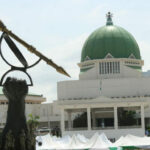Courtesy of its virulence, intensity as well as wide-scale damage and loss of lives and property, the recent wave of protests under the aegis of #EndSARS, compelled the federal and state governments to consider a complement of concessions as the basis for stemming it and moving the country forward.
Among the concessions was the acceptance of the demands of the protesters, which started with a five-point agenda that later expanded to seven.
Specifically, the seven-point demand of the protesters featured the call for institutional reforms in the country’s security architecture, reduction in the cost of governance with a new emphasis on increasing capital expenditure to 50 per cent across the board. Others are the calls for reforms of the constitution as well as enhancing the delivery of those services such as education, health and youth empowerment. It also called for a more efficient public service.
It is a good coincidence that these issues came up at a time when both the federal and state governments are processing their respective 2021 budget.
Given that the budget is a process of planning for the succeeding year’s fiscal operations by government, the current budget 2021 season offers all levels of government in Nigeria the opportunity to facilitate the needed changes in the country’s fiscal terrain, pursuant to delivering on their promises to Nigerians.
A principal justification for the government to consider actualising the promises it made over the protest is with respect to the deleterious impact of the protests on the already beleaguered Nigerian economy and, in particular, the stalling of its critically needed recovery. It is easily recalled that even as the protests had started with the condemnation of the SARS unit of the police, it was clear from the beginning that the root causes of the protests go beyond the excesses of the police. As the numbers of the protesters increased into multitudes and the anomie spread to more states beyond its cradles of Lagos and Abuja, the list of grievances also increased with the state of the economy turning out to be a most critical trigger for the street rage. Given the undeniable lapses in these statutorily guaranteed areas of public service, the response of government should not be salutary and cosmetic, but traverse whatever areas of pain as expressed by the protesters. With the budget 2021 exercise now on course, the various governments need to exercise a drastic reworking of specific areas to accommodate the areas which desire reforms.
However, just as the budget 2021 offers a window for the government to redress some of the weaknesses in its service delivery regime, there is a need for caution in the implementation of such reforms. A typical instance is in the area of boosting employment, which some states are latching on to earn some shine from their people.
We strongly advise that governments at all levels should exercise restraint in promising only those things that they could deliver to their people. What should matter to them is an enduring legacy rather than cheap publicity or gains.
It would be much better to design programmes that could be sustained and expanded later and bring more benefits to their people.
Needless to point out that Nigerians are expecting to see significant changes in the process of governance and budget 2021 remains the most important indicator for gauging the government’s commitment to its word.
If properly utilised this provides a window of opportunity to meet the yearnings of many Nigerians especially the youth, and open the way to rebuild our economy badly battered by the COVID-19 pandemic as well as the #EndSARS protests.

 Join Daily Trust WhatsApp Community For Quick Access To News and Happenings Around You.
Join Daily Trust WhatsApp Community For Quick Access To News and Happenings Around You.


